Search for your villa
Newsletter Signup
If you want to receive our newsletter, please type your email and then subscribe.
Guest's Comment
Bali Info
| 1. Bali, the Island of Gods | 7. Transportation |
| 2. Climate in Bali | 8. Shopping |
| 3. Electricity | 9. Health |
| 4. Visa | 10. Sports |
| 5. Customs Declaration | 11. Insurance |
| 6. Communication | 12. Money and Currency |
Bali, the island of Gods, is one of more than 14,000 islands in the Indonesian archipelago, it is inhabited by warm and friendly people with a distinct Hindu culture and exudes a charm and beauty that is truly unique. From its majestic volcanoes, breathtaking rice terraces, ancient palaces and temples in the hinterland to the stunning beaches, spas and magnificent hotels that line its coast, Bali remains a favorite for many travellers from around the world. The island’s beaches and spas are its main attractions but plan plenty of time to explore the sights and experience the intriguing culture Bali has to offer.

With sunshine shining throughout the year, Bali has a tropical monsoon climate, with pleasant day temperatures between 20 to 33 degrees Celsius or 68 to 93 degrees Fahrenheit. Rainy season starts from October to March, when the West monsoon brings heavy showers and high humidity. June to September is considered the driest season, with low humidity and it can be fairly cold in the evenings, the best time for any outdoor activities.
Something unique can be found about climate in Bali. Even when it rains most times in the most parts of Bali you can often enjoy sunny days on the "Bukit", the hill south of Jimbaran. On the other hand, you may expect cloudy skies and drips throughout the year in Ubud and the mountainous areas. Most interestingly perhaps, the international weather reports for "Denpasar" or "Bali" mention showers and rain storms all times of the year. In higher regions such as in Bedugul or Kintamani you'll expect to wear either a sweater or jacket when evening falls.
Something unique can be found about climate in Bali. Even when it rains most times in the most parts of Bali you can often enjoy sunny days on the "Bukit", the hill south of Jimbaran. On the other hand, you may expect cloudy skies and drips throughout the year in Ubud and the mountainous areas. Most interestingly perhaps, the international weather reports for "Denpasar" or "Bali" mention showers and rain storms all times of the year. In higher regions such as in Bedugul or Kintamani you'll expect to wear either a sweater or jacket when evening falls.
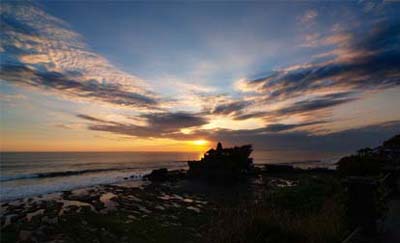
Electricity generally runs at 220V – 240V AC. In some rural areas, the system still runs on 110V, and some remote areas do not have electricity at all. Power supply may be unstable. You may need a plug adaptor with two-pronged, parallel pins.

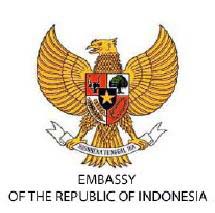 Be sure to check your passport before coming to Indonesia. You must have at least one empty page to be stamped upon arrival and the passport must be valid for at least six months after the date of arrival.
Be sure to check your passport before coming to Indonesia. You must have at least one empty page to be stamped upon arrival and the passport must be valid for at least six months after the date of arrival.Since the 1st July 2015, a tourist visa is no more required for 45 countries in the world (see on the map below). All those countries can now benefit from a free journey up to 30 days in Indonesia. That means you can go directly to imigration when you arrive at Denpasar.
Nevertheless, other countries such as Australia,for example, still need a visa when they enter to the country. For them, it is possible to obtain a tourist visa upon arrival : it costs 25 USD (up to 30 days) and 10 USD (up to 3 days). Anyway, it still takes a bit longer for you so it is preferable to ask in your own country the visa from an Indonesian consulate before having your trip in Bali.
Upon arrival, you will be given a white embarkation/disembarkation card to fill out. Keep this card with your passport, as you must present it when leaving the country.
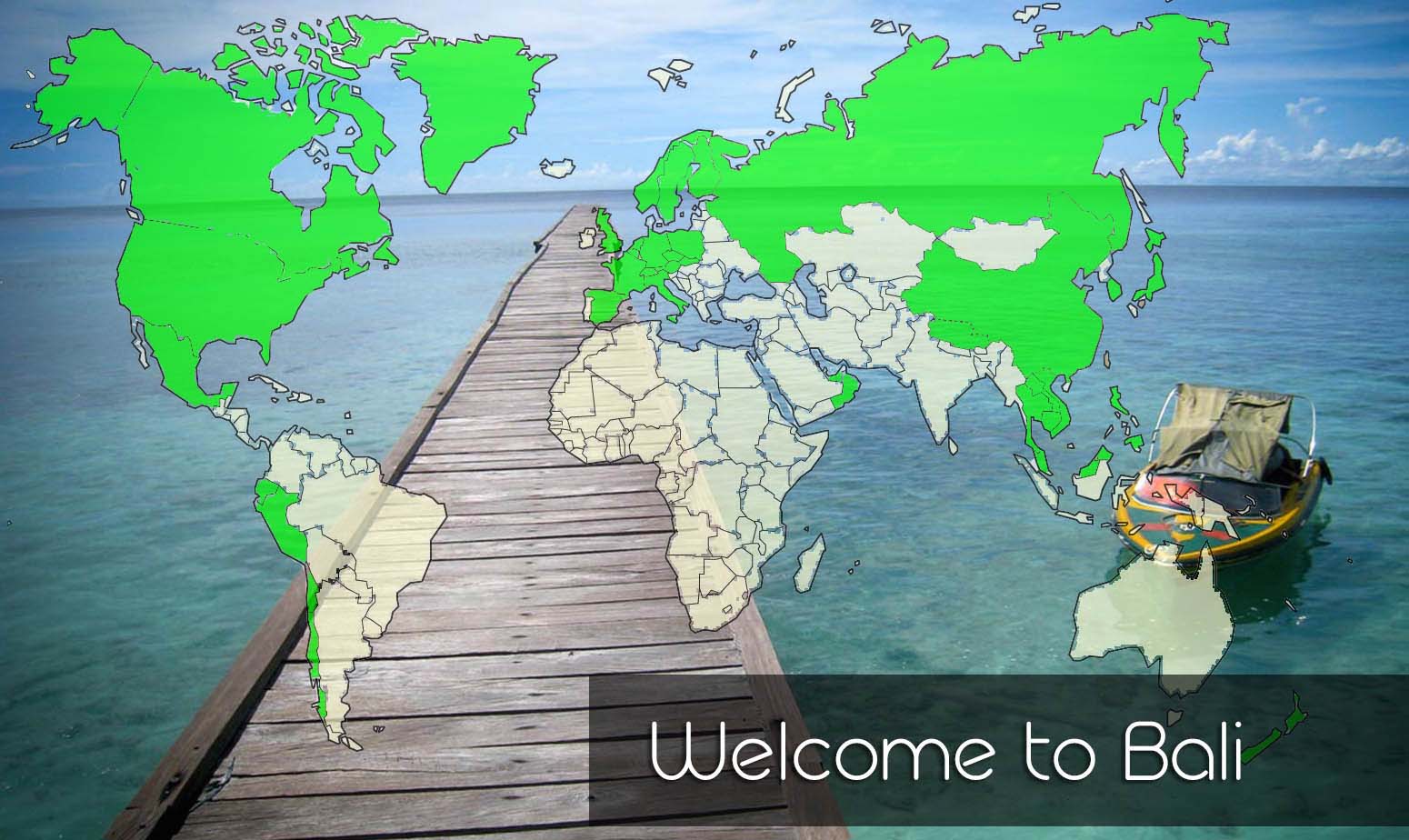
Indonesia's postal service is reliable, if not terribly fast. Kilat (express) service is only slightly more expensive and much faster. Kilat khusus (domestic special delivery) will get there overnight. International express mail gets postcards and letters to North America or Europe in about 7 days from most cities.
Kantor pos (post offices) are found in every little village in Bali, open 8 am-2 pm every day except Sunday. The main post offices are in Denpasar at JI. Raya Puputan, Renon; and in Legian. They remain open until 8 pm. Most of them are close from noon to 1 pm for lunch. Poste Restante service is usually reliable, but it is advisable to choose more important towns such as Kuta or Ubud. Some post offices ask for ID and may also charge a fee before handing over your letters.
Kantor pos (post offices) are found in every little village in Bali, open 8 am-2 pm every day except Sunday. The main post offices are in Denpasar at JI. Raya Puputan, Renon; and in Legian. They remain open until 8 pm. Most of them are close from noon to 1 pm for lunch. Poste Restante service is usually reliable, but it is advisable to choose more important towns such as Kuta or Ubud. Some post offices ask for ID and may also charge a fee before handing over your letters.
- Mail
Indonesia's postal service is slow and reliable. Kilat (express) service is only slightly more expensive and much faster. Kilat khusus (domestic special delivery) will get there overnight. International express mail gets postcards and letters to North America or Europe in about 7 days from most cities
Kantor pos (post offices) are found in every little village in Bali, open 8 am-2 pm every day except Sunday. The main post offices are in Denpasar at JI. Raya Puputan, Renon; and in Legian. They remain open until 8 pm. Most of them are close from noon to 1 pm for lunch. Poste Restante service is usually reliable, but it is advisable to choose more important towns such as Kuta or Ubud. Some post offices ask for ID and may also charge a fee before handing over your letters.
A magnetic debit (kartu telpon) phone card can be purchased at hotels, post offices and many other outlets. This is used on card phones, which are increasing in popularity, eliminating the need for small change.
International calls via MCI, Sprint, ATF, and the like can be made from IDD phones using the access code for your calling card company. Recently, special telephones have been installed in some airports with pre-programmed buttons to connect you via these companies to various countries.
Faxes can be sent and received at wartel offices and most main post offices.
E-mail and internet services are available at many wartel, the main post office and cyber cafes. Most tourist areas are dotted with internet cafes and services. Some are open 24 hours a day, but most open from 10 am until 10 pm. Usage rates vary and are independent on type and length of computer use, but they rarely unreasonable.
Kantor pos (post offices) are found in every little village in Bali, open 8 am-2 pm every day except Sunday. The main post offices are in Denpasar at JI. Raya Puputan, Renon; and in Legian. They remain open until 8 pm. Most of them are close from noon to 1 pm for lunch. Poste Restante service is usually reliable, but it is advisable to choose more important towns such as Kuta or Ubud. Some post offices ask for ID and may also charge a fee before handing over your letters.
- Telephone, Fax and internet
Long distance phone calls, both within Indonesia and international, are handled by satellite. Domestic long distance calls can be dialed from most phones. To dial your own international calls, find an IDD (International Direct Dial) phone and dial "001" or "008” otherwise you must go via the operator, which is far more expensive.A magnetic debit (kartu telpon) phone card can be purchased at hotels, post offices and many other outlets. This is used on card phones, which are increasing in popularity, eliminating the need for small change.
International calls via MCI, Sprint, ATF, and the like can be made from IDD phones using the access code for your calling card company. Recently, special telephones have been installed in some airports with pre-programmed buttons to connect you via these companies to various countries.
Faxes can be sent and received at wartel offices and most main post offices.
E-mail and internet services are available at many wartel, the main post office and cyber cafes. Most tourist areas are dotted with internet cafes and services. Some are open 24 hours a day, but most open from 10 am until 10 pm. Usage rates vary and are independent on type and length of computer use, but they rarely unreasonable.
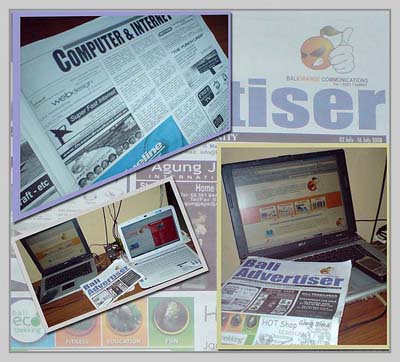
There are various ways you can explore the island:
| - | Walking - You can walk along the beaches, the gardens of Nusa Dua, or along the shops of Legian and Kuta. It is very agreeable for visiting and doing shopping. |
| - | Bicycles - There is a lot of places where you can rent bicycles. |
| - | Motorcycles - Some hard-to-reach beach corners, hidden surfing sites, may not be reachable by car - motorcycles may be your best bet. Don't forget your international driver's license. |
| - | Car Rentals/Hires- You can cover all Bali comfortably with complete privacy and with your own schedule. Rates start from around US$ 25 a day. Toyota Rent-A-Car can provide anything from a subcompact car to a luxurious Japanese sedan, with or without a driver. Don't forget your international driver's license if you want to drive |
| - | Taxis – They are not expensive and you can hire by phone or find one almost everywhere. Bluebird group taxis are recommended |
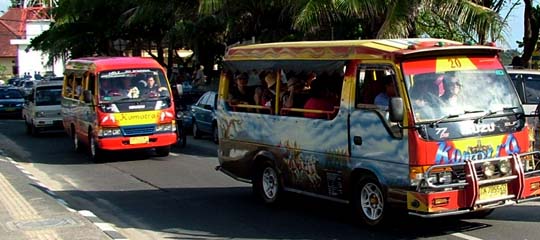
Shopping in Bali is not simply walking into a shop, picking something from a shelf and paying for it. Shopping is an art. In every traditional market and art shop around Bali bargaining is a must. This traditional way makes shopping in Bali a fun time, where you can feel the warmth of human value in every transaction. Before you begin your shopping tour on this island, please obtain cash because most places do not accept credit cards.
Few places for shopping:
Few places for shopping:
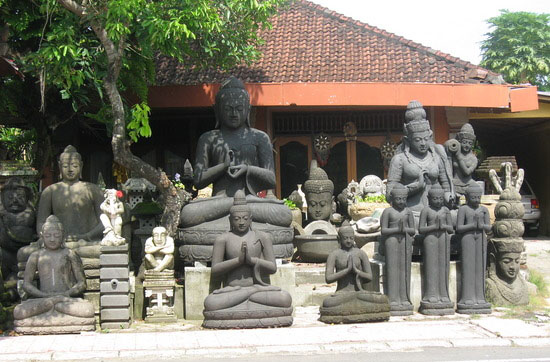 Batubulan, on the border of Denpasar and Gianyar, is the home of stone sculptures. You can find various kinds of style here, from traditional to modern, small to large. The craftsmen can make up your order and even arrange to ship it to your address back home.
Batubulan, on the border of Denpasar and Gianyar, is the home of stone sculptures. You can find various kinds of style here, from traditional to modern, small to large. The craftsmen can make up your order and even arrange to ship it to your address back home.
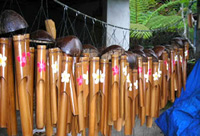 This village of Bono is the home of bamboo. The villagers create furniture and mats from bamboo; they also make some articles from lontar leaf.
This village of Bono is the home of bamboo. The villagers create furniture and mats from bamboo; they also make some articles from lontar leaf.
 On the way to Ubud you'll pass Celuk, the place for gold and silver jewelry. The artisans in this area are well known for their quality and various designs. Huge art shops along the main road give you a chance to compare prices.
On the way to Ubud you'll pass Celuk, the place for gold and silver jewelry. The artisans in this area are well known for their quality and various designs. Huge art shops along the main road give you a chance to compare prices.
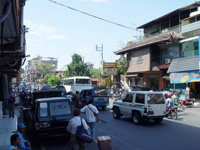 As the capital of Bali, Denpasar is the center of "market" activity for local people. The biggest traditional market stands near Badung's river, Kumbasari market. It can give you an insight into the traditional Indonesia market where local people do their daily shopping. Fruit, vegetables and meat can be found in the basement; on the second level is the place for spices and dried goods; while household wares, clothing, art and craft is on the third level. Here you can get a very good price if you're smart in bargaining. In the northern part is Gajahmada Street, where you can find handicrafts and some shoe shops and restaurants. In the eastern part is Sulawesi Street, the place for all kind of fabrics on its both sides with some shops providing household ware in between. The area here is very colorful with all types of material from the traditional 'songket' (cloth woven with strands of gold or silver) to modern day stretchy and shiny material. Why not buy your cloth by the meter and have a suit or dress made up by a local tailor. In the southern part is Hasanudin Street where you can see gold shops, selling jewelry to local people but, of course, the visitor is welcome to buy but please bargain. On the west Side of the market is the place for people to buy coconut leaf and ceremony supplies.
As the capital of Bali, Denpasar is the center of "market" activity for local people. The biggest traditional market stands near Badung's river, Kumbasari market. It can give you an insight into the traditional Indonesia market where local people do their daily shopping. Fruit, vegetables and meat can be found in the basement; on the second level is the place for spices and dried goods; while household wares, clothing, art and craft is on the third level. Here you can get a very good price if you're smart in bargaining. In the northern part is Gajahmada Street, where you can find handicrafts and some shoe shops and restaurants. In the eastern part is Sulawesi Street, the place for all kind of fabrics on its both sides with some shops providing household ware in between. The area here is very colorful with all types of material from the traditional 'songket' (cloth woven with strands of gold or silver) to modern day stretchy and shiny material. Why not buy your cloth by the meter and have a suit or dress made up by a local tailor. In the southern part is Hasanudin Street where you can see gold shops, selling jewelry to local people but, of course, the visitor is welcome to buy but please bargain. On the west Side of the market is the place for people to buy coconut leaf and ceremony supplies.
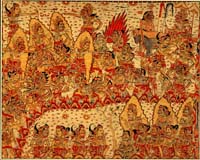 Kamasan, this village in Klungkung is popular with its own style of painting called Kamasan where a drawing is made in black ink then colored by natural pigments.
Kamasan, this village in Klungkung is popular with its own style of painting called Kamasan where a drawing is made in black ink then colored by natural pigments.
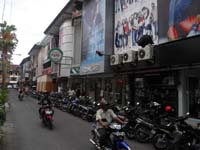 Kuta as an international village almost all of the shops and restaurants here are for tourist market. You can find handicrafts, clothing, jewelry, CDs, furniture and leather crafts on each side of the road. But you can also see many street hawkers with their various offerings along the road. If you do not want to buy anything from them, do not make eye contact and do not ever look at their products, for if you do, they will follow you along the street and pester you to buy something.
Kuta as an international village almost all of the shops and restaurants here are for tourist market. You can find handicrafts, clothing, jewelry, CDs, furniture and leather crafts on each side of the road. But you can also see many street hawkers with their various offerings along the road. If you do not want to buy anything from them, do not make eye contact and do not ever look at their products, for if you do, they will follow you along the street and pester you to buy something.
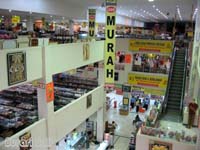 The shopping center in Sanur is on Jalan Danau Tamblingan where the situation is almost the same as Kuta but with very few hawkers. Many products are on offer in the shops and nice restaurants.
The shopping center in Sanur is on Jalan Danau Tamblingan where the situation is almost the same as Kuta but with very few hawkers. Many products are on offer in the shops and nice restaurants.
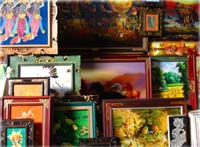 Sukawati, this area is popular because for its Art Market. If you ask Balinese where to find art and craft with the cheapest price, they will recommend Sukawati. Here you can find cloth, paintings and statue, jewelry and also Balinese ceremonial items.
Sukawati, this area is popular because for its Art Market. If you ask Balinese where to find art and craft with the cheapest price, they will recommend Sukawati. Here you can find cloth, paintings and statue, jewelry and also Balinese ceremonial items.
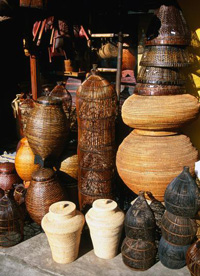 Tegalalang: various woodcarvings can be found in this village and its neighbors. Very colorful carvings of flowers, animals and other designs are displayed along the road.
Tegalalang: various woodcarvings can be found in this village and its neighbors. Very colorful carvings of flowers, animals and other designs are displayed along the road.
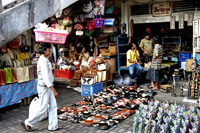 Ubud, this well-known village offers you fine arts with an international standard. Respected galleries such as Agung Rai, Sumertha, Rudana, Sika and Neka are recommended visiting as well as the big names of Hans Snel and Antonio Blanco.
Ubud, this well-known village offers you fine arts with an international standard. Respected galleries such as Agung Rai, Sumertha, Rudana, Sika and Neka are recommended visiting as well as the big names of Hans Snel and Antonio Blanco.
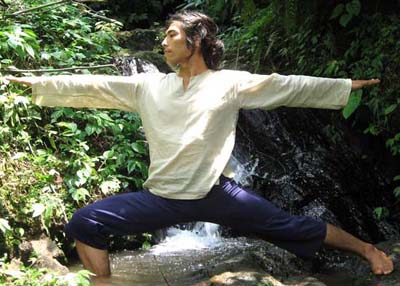
One key thing to remember about Bali is that it is located just 80 south of the equator and consequently the air temperature is hot and quite humid. Visitors will face tropical weather and should careful in their tanning habits in order not to get burnt, especially right after arrival. Furthermore it is recommended to make an effort to drink more fluids than normal in order to avoid dehydration.
One of the most important facts about Bali is that unlike many other areas in the region, it is non-malarial. Therefore any malaria prophylactics are unnecessary, unless you plan to travel onto a malarial region. Bali supports a number of Western-trained health professionals along with several expatriate doctors who work in some of the local clinics and hospitals. This infrastructure suffices for the majority of any health problems. In the unfortunate cases, if something more is needed, Singapore’s world-class physicians and institutions are just two hours away by plane.
If you plan to bring any prescription medications with you, join a copy of your doctor’s prescription to avoid unnecessary trouble from Indonesian customs. Traveler’s health insurance is recommended.
All travelers should visit either their personal doctor or a travel health clinic 4-8 weeks before departure.
| Hepatitis A | Recommended for all travelers |
| Typhoid | For travelers who may eat or drink outside major restaurants and hotels |
| Measles, mumps, rubella (MMR) | Two doses recommended for all travelers born after 1956, if not previously given |
| Tetanus-diphtheria | Revaccination recommended every 10 years |
Bali, as an island, is surrounded by sea. All year-long, sunshine gives you a chance to enjoy many offshore attractions.
Diving and snorkeling are among major attractions in Bali. Divers can view various marine creatures, such as colorful tropical fish and coral reefs. The best time for diving here is in the dry season that lasts from April to October, when warmer temperatures invite more fish and the objects can be clearly viewed.
Bali offers a lot of sites for beginners and professional divers, with some of them adjacent to the shore with abundant colorful hard and soft corals. Once you start diving, a wide variety of marine life, such as dolphins, rays, turtle, sea snakes and moray eels will greet you.
The locations for diving and snorkeling in Bali spread out along Bali's sea. The popular sites are located on the southern part: Sanur and Nusa Island (Lembongan and Nusa Penida); in the western part are Labuan Lalang, Menjangan Island, an uninhabited island with some of the best diving in Bali; in the north of the island is Lovina that will undoubtedly satisfy your diving needs. On the east coast are Amed where virgin nature can be enjoyed, Tulamben, Candidasa and Padang Bay also.
Surfing can be done every day in Bali. Bali's magnificent surfing was introduced by Australian surfers at the end of 60's, and since then, Bali has become a paradise for surfers. Not just because of various choices for beaches and breaks, but surfing in Bali can be done every day! Perfect wave to ride on are always available somewhere on this island. Kuta and Ulawatu are recognized for their magnificent surfing waves.
Out-standing reef breaks are found in Kuta and Sanur. Sanur reef is a real pleasure because, here you will find a tube-forming wave that will carry you back to the seashore and in this way, it is unnecessary for you to paddle like a madman.
Diving and snorkeling are among major attractions in Bali. Divers can view various marine creatures, such as colorful tropical fish and coral reefs. The best time for diving here is in the dry season that lasts from April to October, when warmer temperatures invite more fish and the objects can be clearly viewed.
Bali offers a lot of sites for beginners and professional divers, with some of them adjacent to the shore with abundant colorful hard and soft corals. Once you start diving, a wide variety of marine life, such as dolphins, rays, turtle, sea snakes and moray eels will greet you.
The locations for diving and snorkeling in Bali spread out along Bali's sea. The popular sites are located on the southern part: Sanur and Nusa Island (Lembongan and Nusa Penida); in the western part are Labuan Lalang, Menjangan Island, an uninhabited island with some of the best diving in Bali; in the north of the island is Lovina that will undoubtedly satisfy your diving needs. On the east coast are Amed where virgin nature can be enjoyed, Tulamben, Candidasa and Padang Bay also.
Surfing can be done every day in Bali. Bali's magnificent surfing was introduced by Australian surfers at the end of 60's, and since then, Bali has become a paradise for surfers. Not just because of various choices for beaches and breaks, but surfing in Bali can be done every day! Perfect wave to ride on are always available somewhere on this island. Kuta and Ulawatu are recognized for their magnificent surfing waves.
Out-standing reef breaks are found in Kuta and Sanur. Sanur reef is a real pleasure because, here you will find a tube-forming wave that will carry you back to the seashore and in this way, it is unnecessary for you to paddle like a madman.
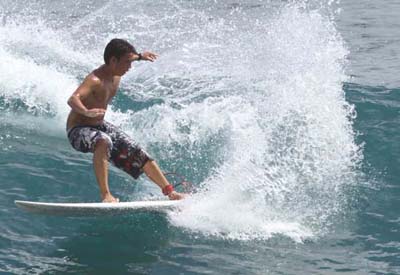
Water sport is not only the attraction that you will find in Bali. Horse riding, bike, fitness, tennis, football, trekking and many others … You can also find Spa almost everywhere to relax after your effort.
GOLF : Bali proposes three magnificent 18 holes golf courses situated in different areas including one of the most famous golf course in Asia the Nirwana Golf course designed by Greg Norman surrounded by the Ocean terraces, temple and rice fields.
At last, on the north of Bali we can also discover a range of volcanos where many treks are organised so you can experience their wonderful views from the top!
Tested, we approved: The Mount Batur trekking. It is considered as sacred by the Hindu religion and is located in Kintamani District. It offers from the top of its 1717m a spectacular sunrise.
Two options are then presented to you:
- The Little Tour including breakfast at sunrise and going the way back down by foot.
- The Big Tour including breakfast at sunrise, going around the ridge and walking down the other side of the volcano.
GOLF : Bali proposes three magnificent 18 holes golf courses situated in different areas including one of the most famous golf course in Asia the Nirwana Golf course designed by Greg Norman surrounded by the Ocean terraces, temple and rice fields.
At last, on the north of Bali we can also discover a range of volcanos where many treks are organised so you can experience their wonderful views from the top!
Tested, we approved: The Mount Batur trekking. It is considered as sacred by the Hindu religion and is located in Kintamani District. It offers from the top of its 1717m a spectacular sunrise.
Two options are then presented to you:
- The Little Tour including breakfast at sunrise and going the way back down by foot.
- The Big Tour including breakfast at sunrise, going around the ridge and walking down the other side of the volcano.
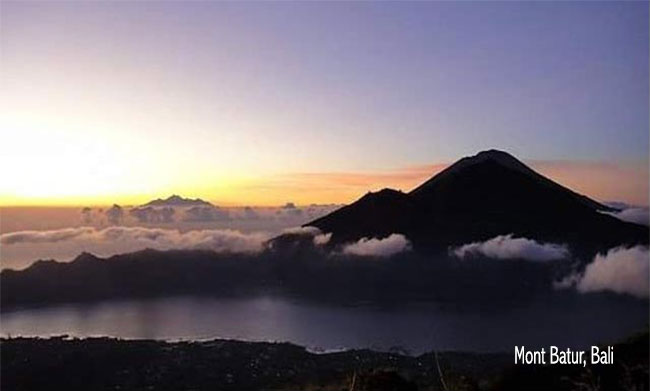
Check your health insurance before coming to make sure you are covered. Travel insurance should include coverage of a medical evacuation to Singapore and a 24 hour worldwide phone number as well as some extras like luggage loss and trip cancellation.
Insurance are not compulsory in Indonesia, therefore make sure that the insurance is including and in force when you rent a motor vehicle, practice sports
Insurance are not compulsory in Indonesia, therefore make sure that the insurance is including and in force when you rent a motor vehicle, practice sports
The Indonesian monetary unit is called the rupiah. Exchange facilities for the main foreign currencies are available in the major business centers of Bali. Rupiahs come in denominations of: 100.000, 50.000, 20.000, 10.000, 5000, 1000 bank notes. And the smallest denomination of coins is 25 rupiah, then 50, 100, 200, 500 and now there are also 1,000 rupiah coins.
The rate at the end of 2013 is 12160 Rp per 1 USD. Bills are all roughly the same size but different colors, so put larger denomination bills in a different section of your wallet or purse or else you may confuse them with smaller bills. Carry enough small change and bills to pay bemo or taxi drivers and market sellers.
Major credit cards are accepted in a wide variety of shops and restaurant. Visa and MasterCard are the most frequently accepted.
The rate at the end of 2013 is 12160 Rp per 1 USD. Bills are all roughly the same size but different colors, so put larger denomination bills in a different section of your wallet or purse or else you may confuse them with smaller bills. Carry enough small change and bills to pay bemo or taxi drivers and market sellers.
Major credit cards are accepted in a wide variety of shops and restaurant. Visa and MasterCard are the most frequently accepted.
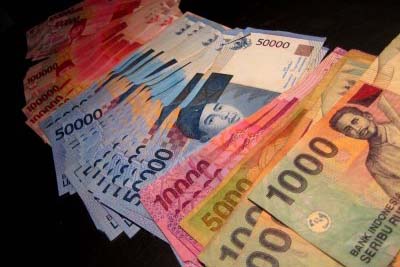





read more
We had the most fantastic holiday at Villa Kenyeri. All of the staff looked agter us very well,...
read more
Thank you so much for wonderful 2 weeks at Palm River. It was the best Holiday of Our lives...
read more
A wonderful family home. Well appreciated and private for each group. Casual living area, well equipped and comfortable...
read more